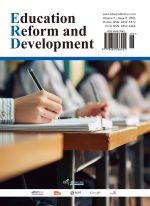Abstract
In recent years, the rapid advancement of digital technology has presented new opportunities for the development of rural education through digital transformation. The emergence of generative artificial intelligence (AIGC) has garnered significant attention, leading to an increased interest in its application within educational contexts. This study employs the Flanders Interaction Analysis System (FIAS) to investigate the feasibility of integrating AIGC into English classrooms in rural areas, focusing specifically on classroom interaction dynamics. The findings indicate that AIGC technology can enhance students’ willingness to express themselves and participate, and mitigate the traditional teacher-student imbalance prevalent in conventional teaching methods. Furthermore, AIGC serves as a supplementary tool that bolsters the stability and adaptability of classroom interactions, although it still maintains a degree of detachment from the students. Future research should aim to extend the duration of practical applications, foster greater student agency, and explore additional modalities for AIGC integration in the classroom to achieve more comprehensive educational outcomes.
References
Fu H, Liu H, 2024, A Comparative Study of Learners’ Conceptions of and Approaches to Learning English Between High School Students in Urban and Rural Areas of China. Frontiers in Psychology, 15: 1324366–1324366.
Huang J, 2023, Research on Advancing Educational Equity Under Chinese Government Leadership in Basic Education. Open Access Library Journal, 10: e10364.
Ma L, Xiao L, Liu J, 2021, Motivational Beliefs of Urban and Rural Students in English as a Foreign Language Learning: The Case of China. Journal of Multilingual and Multicultural Development, 45(5): 1524–1537.
Sun K, 2024, Dilemmas and Path Exploration in the Development of Educational Digital Transformation. Cross-Cultural Design. HCII 2024. Lecture Notes in Computer Science, 14701.
Li J, Zhu S, Yang H, et al., 2024, What Does Artificial Intelligence Generated Content Bring to Teaching and Learning? A Literature Review on AIGC in Education. 2024 International Symposium on Educational Technology (ISET): 18–23.
Li Q, Peng B, Ke Q, 2023, Research on Interactive Behavior of Artificial Intelligence Classroom Teaching in Primary Schools Based on IFIAS. Proceedings of the 2023 6th International Conference on Educational Technology Management, Guangzhou, China.
Yao C, Shao S, 2024, Factors Affecting Teacher-Student Interactions in a Foreign Language Teaching Class: A Language Socialisation Theory Perspective. Humanities and Social Sciences Communications, 11(1): 1358–1358.
Su C, Xiaojie N, Yuxi W, et al., 2023, Interaction Analysis of Teachers and Students in Inquiry Class Learning Based on Augmented Reality by IFIAS and LSA. Interactive Learning Environments, 31(9): 5551–5567.
Zhong Y, Davies M, Wilson A, 2024, The Impact of a Dialogic Intervention on a Chinese Rural Teacher and Students’ Stances Towards Texts. European Journal of Education, 60(1): e12816–e12816.
Yang B, Xie C, Liu T, et al., 2023, Exploring the Relationship Between Teacher Talk Supports and Student Engagement From the Perspective of Students’ Perceived Care. Interactive Learning Environments, 32(10): 6393–6412.
Chunlin Y, 2022, Is a One-Way English Immersion Teaching Approach Equitable to Those Chinese Non-English Major Students From Rural Areas? Education and Urban Society, 54(4): 470–486.
Munawwarah S, 2021, Teacher-Students’ Interaction in EFL Teaching: Analyzing Patterns of Classroom Interaction. Eralingua Jurnal Pendidikan Bahasa Asing dan Sastra, 5(2): 416–435.
Sun Z, Li H, Ye T, et al., 2015, Flanders Interaction Analysis in the Teaching of “Medical Cellular Biology”. Proceedings of 2015 International Conference on Social Science, Education Management and Sports Education (SSEMSE 2015). Shanghai University of Traditional Chinese Medicine: 1758–1762.
Chen N, Luo Y, Han X, 2019, Designing a System for Collecting and Analyzing Behavior Data of Instructors and Students in Blended Courses. 2019 Eighth International Conference on Educational Innovation Through Technology (EITT): 51–55.
Falloon G, 2020, From Digital Literacy to Digital Competence: The Teacher Digital Competency (TDC) Framework. Educational Technology Research and Development, 68(5): 1–24.
